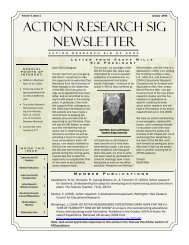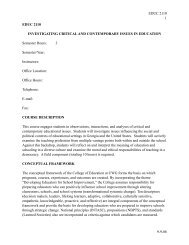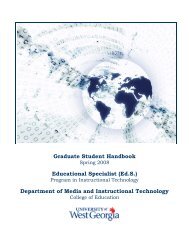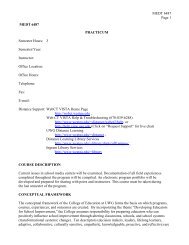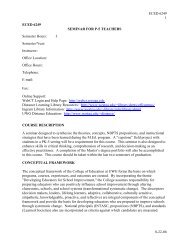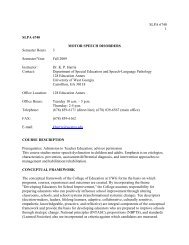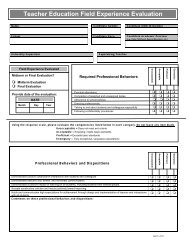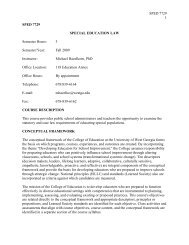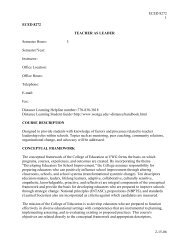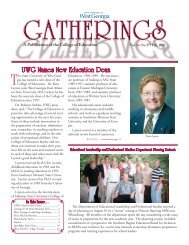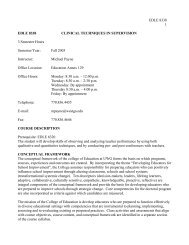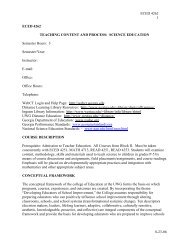PDF Format - College of Education - The University of West Georgia
PDF Format - College of Education - The University of West Georgia
PDF Format - College of Education - The University of West Georgia
Create successful ePaper yourself
Turn your PDF publications into a flip-book with our unique Google optimized e-Paper software.
Semester Hours: 2<br />
Semester/Year: Spring, 2009<br />
Instructors: Dr. Ravic P. Ringlaben<br />
Office Locations: Ed Annex 114<br />
SPED 3752<br />
PRACTICUM II<br />
Office Hours: M 1:30pm-5:00pm, T 3:30-6:00pm, W 2:00pm-6:00pm<br />
Telephone: Office -678/839-6123 Department- 678/839-6567<br />
E-mail: rringlab@wetga.edu<br />
Fax: 678/839-6162<br />
COURSE DESCRIPTION<br />
Prerequisites: Admission to Teacher <strong>Education</strong>; completion <strong>of</strong> Block I or permission <strong>of</strong><br />
instructor. Application for field experience required prior to enrollment.<br />
1<br />
SPED 3752<br />
Field experience in the public schools under the supervision <strong>of</strong> an experienced, qualified<br />
classroom teacher on the level <strong>of</strong> and in the field <strong>of</strong> intended certification. This course is<br />
designed to provide students with the opportunity to participate in activities in which teachers <strong>of</strong><br />
students with mild disabilities typically engage. Requires full time participation in a school<br />
setting for a period <strong>of</strong> 5 weeks.<br />
CONCEPTUAL FRAMEWORK<br />
<strong>The</strong> conceptual framework <strong>of</strong> the <strong>College</strong> <strong>of</strong> <strong>Education</strong> at UWG forms the basis on which<br />
programs, courses, experiences, and outcomes are created. By incorporating the theme<br />
“Developing Educators for School Improvement,” the <strong>College</strong> assumes responsibility for<br />
preparing educators who can positively influence school improvement through altering<br />
classrooms, schools, and school systems (transformational systemic change). Ten descriptors<br />
(decision makers, leaders, lifelong learners, adaptive, collaborative, culturally sensitive,<br />
empathetic, knowledgeable, proactive, and reflective) are integral components <strong>of</strong> the conceptual<br />
framework and provide the basis for developing educators who are prepared to improve schools<br />
through strategic change. National principles (INTASC), propositions (NBPTS), and standards<br />
(Learned Societies) also are incorporated as criteria against which candidates are measured.<br />
<strong>The</strong> mission <strong>of</strong> the <strong>College</strong> <strong>of</strong> <strong>Education</strong> is to develop educators who are prepared to function<br />
effectively in diverse educational settings with competencies that are instrumental to planning,
2<br />
SPED 3752<br />
implementing, assessing, and re-evaluating existing or proposed practices. This course’s<br />
objectives are related directly to the conceptual framework and appropriate descriptors,<br />
principles or propositions, and Learned Society standards are identified for each objective. Class<br />
activities and assessments that align with course objectives, course content, and the conceptual<br />
framework are identified in a separate section <strong>of</strong> the course syllabus.<br />
COURSE OBJECTIVES<br />
Students will:<br />
1. demonstrate appropriate pr<strong>of</strong>essional, ethical and interpersonal behaviors while in school<br />
settings (Bateman & Linden, 2006; <strong>College</strong> <strong>of</strong> <strong>Education</strong>, 2006; Cohen, Gale & Meyer,<br />
2005; Correa, Jones, Thomas & Morsink, 2005; Council for Exceptional Children, 2003;<br />
deBettencourt & Howard, 2007; Friend & Cook, 2007; Rosenberg, O’Shea & O’Shea,<br />
2006; Turnbull, Turnbluu, Erwin & Soodak, 2006; Winzer & Mazurek, 1998; Wong &<br />
Wong, 1998)<br />
(Adaptive, Collaborative, Culturally Sensitive, Knowledgable, Reflective; CEC* &<br />
INTASC** 9, 10);<br />
2. participate in activities designed to increase awareness <strong>of</strong> educational implications for<br />
students with mild and moderate disabilities (Bateman & Linden, 2006; Cohen & Spenciner,<br />
2003; Correa et al., 2005; Darch & Kame´enui, 2004; Heward, 2006; Rosenberg et al.,<br />
2006)<br />
(Knowledgeable; CEC & INTASC 2, 3, 10);<br />
3. participate in assistance-level activities designed to expose them to typical duties <strong>of</strong> teachers<br />
<strong>of</strong> pupils with mild/moderate disabilities related to assessment and instruction (Council for<br />
Exceptional Children, 2003; deBettencourt & Howard, 2007; Foster et al., 2007; Turnbull et<br />
al., 2006) (Adaptive, Culturally Sensitive, Knowledgeable, Reflective; CEC & INTASC 1-<br />
10)<br />
4. participate in assessment activities, including collecting, analyzing, and evaluating<br />
individual and classroom performance data (Alberto & Troutman, 2006; Cohen &<br />
Spenciner, 2003; Council for Exceotuibak /cgukdrebm 2003; Heward, 206; Howell &<br />
Nolet, 2000; Polloway et al., 2008’ Popham, 2005; Rosenberg et al., 2006; Sabornie &<br />
deBettencourt, 2004) (Decision Makers, Adaptive Knowledge, Proactive, Reflective;<br />
NTASC & CEC 2-8)<br />
5. identify strategies to prevent stress burnout (Council for Exceptional Children, 2003;<br />
deBettencourt & Howard, 2007). (Decision Makers, Knowledgeable, Lifelong Learners,<br />
proactive, Reflective; CEC & INTASC 9)
3<br />
SPED 3752<br />
*CEC refers to the ten Special <strong>Education</strong> Content Standards <strong>of</strong> the Council for Exceptional<br />
Children, which are now aligned with the ten INTASC principles; the CEC standards are<br />
available from: http://www.cec.sped.org/ps/perf_based_stds/standards.html#standards<br />
**INTASC refers to the standards <strong>of</strong> the Interstate New Teacher Assessment and Support<br />
Consortium. Information on core principles and standards specific to special education are<br />
available from:<br />
http://www.ccsso.org/projects/Interstate_New_Teacher_Assessment_and_Support_Consortium/P<br />
rojects/Standards_Development/<br />
TEXTS, READINGS, AND INSTRUCTIONAL RESOURCES<br />
Required Text:<br />
<strong>College</strong> <strong>of</strong> <strong>Education</strong>. (2006). Teacher education, field experiences and internship: Policies and<br />
procedures handbook (2006-2007). Carrollton, GA: <strong>University</strong> <strong>of</strong> <strong>West</strong> <strong>Georgia</strong>, <strong>College</strong><br />
<strong>of</strong> <strong>Education</strong>.<br />
References:<br />
Bateman, B. D., & Linden, M. A. (2006). Better IEPs: How to develop legally correct and<br />
educationally useful programs (4th ed.). Vernon, WI: Attainment Company/IEP Resources.<br />
Bray, M., Brown, A., & Green, T. D. (2004). Technology and the diverse learner. Thousand<br />
Oaks, CA: Corwin.<br />
Cohen, M. K., Gale, M., & Meyer, J. M. (2005). Survival guide for the first-year special<br />
education teacher (Rev. ed). Upper Saddle River, NJ: Pearson/Prentice Hall.<br />
Cohen, L. G., & Spenciner, L. J. (2003). Assessment <strong>of</strong> children and youth with special needs<br />
(2nd ed.). Boston: Allyn & Bacon.<br />
Correa, V. I., Jones, H. A., Thomas, C. C., & Morsink, C. V. (2005). Interactive teaming:<br />
Enhancing programs for students with special needs (4th ed.). Upper Saddle River, NJ:<br />
Pearson/Prentice Hall.<br />
Council for Exceptional Children. (2003). What every special educator must know: Ethics,<br />
standards, and guidelines for special educators (5th ed.). Arlington, VA: Author.<br />
Darch, C. B., & Kame´enui, E. J. (2004). Instructional classroom management (2nd ed.). Upper<br />
Saddle River, NJ: Pearson/Prentice Hall.<br />
deBettencourt, L. U., & Howard, L. A. (2007). <strong>The</strong> effective special education teacher: A<br />
practical guide for success. Upper Saddle, NJ: Pearson/Prentice Hall.<br />
Friend, M., & Cook, L. (2007). Interactions: Collaboration skills for school pr<strong>of</strong>essionals (5th<br />
ed.). Boston: Allyn & Bacon.<br />
Foster, B. R., Jr., Walker, M. L., & Song, K. H. (2007). A beginning teaching portfolio<br />
handbook: Documenting and reflecting on your pr<strong>of</strong>essional growth and abilities. Upper<br />
Saddle, NJ: Pearson/Prentice Hall.<br />
Gibb, G. S., & Dyches, T. T. (2007). Guide to writing quality individualized education programs<br />
(2nd ed.) Boston: Allyn & Bacon.<br />
Heward, W.L. (2006). Exceptional children: An introduction to special education (8th ed.). Upper<br />
Saddle River: NJ: Pearson.
4<br />
SPED 3752<br />
Kuder, S. J. (2003). Teaching students with language and communication disabilities (2nd ed.).<br />
Boston: Allyn & Bacon.<br />
Rosenberg, M. S., O’Shea, L. J., & O’Shea, D. J. (2006). Student teacher to master teacher: A<br />
practical guide for educating students with special needs (4th ed.). New York: Merrill/<br />
Prentice Hall.<br />
Turnbull, A., Turnbull, R., Erwin, E. J., & Soodak, L. C. (2006). Families, pr<strong>of</strong>essionals, and<br />
exceptionality: Positive outcomes through partnership and trust (5th ed.). Upper Saddle<br />
River, NJ: Merrill/Prentice Hall.<br />
Winzer, M. A., & Mazurek, K. (1998). Special education in multicultural contexts. Upper Saddle<br />
River, NJ: Pearson/Prentice Hall.<br />
Wong, H. K., & Wong, R. T. (1998). <strong>The</strong> first days <strong>of</strong> school. Mountain View, CA: Author.<br />
ACTIVITIES AND ASSESSMENTS, EVALUATION PROCEDURES, AND GRADING<br />
POLICY<br />
Link to Conceptual Framework <strong>The</strong> focus <strong>of</strong> this course is on performance within a<br />
classroom (special education program) setting at an advanced level <strong>of</strong> competence. <strong>The</strong><br />
practicum supports the teacher preparation program in general, but is also specifically linked to<br />
two courses, SPED 4712 (Language, Communication, and Technology: Mild Disabilities), and<br />
SPED 4713 (Collaboration in School Settings). COE conceptual framework descriptors tapped<br />
by specific assignments, assessments, and activities are:<br />
• Adaptive (students must show flexibility in working in a new situation and beginning to do<br />
planning on a limited basis in Planning, Instructional, and Assistive Activities and in<br />
Specific Activities)<br />
• Collaborative (students must work with others and see how school personnel collaborate in<br />
planning for youngsters with special needs in Planning, Instructional, and Assistive<br />
Activities)<br />
• Culturally Sensitive (students are working in increasingly diverse school populations<br />
requiring interaction with students, parents, and teachers in that is Culturally Sensitive;<br />
students working in settings with young children may be called upon to interact with parents<br />
in the Planning, Instructional, and Assistive Activities and in Specific Activities)<br />
• Decision Makers (students work to prepare themselves to make a variety <strong>of</strong> program and<br />
instructional decisions in the Planning, Instructional, and Assistive Activities and in<br />
Specific Activities)<br />
• Knowledgeable (students begin to apply information from didactic classes in school settings<br />
and gain additional knowledge related to characteristics, planning, and procedures, as well as<br />
more general information related to service delivery, as reflected in the Planning,<br />
Instructional, and Assistive Activities and in Specific Activities)<br />
• Lifelong Learners (students work to prepare themselves to see that learning is a lifelong<br />
process and to continually work toward improving their knowledge, skills, and dispositions<br />
as reflected in the Planning, Instructional, and Assistive Activities and in Specific<br />
Activities)<br />
• Proactive (students engage in activities designed to help them make decisions in advance<br />
about appropriate assessment, IEPs, instruction, classroom management, and collaboration<br />
instructors in the Planning, Instructional, and Assistive Activities and in Specific<br />
Activities)
5<br />
SPED 3752<br />
• Reflective (students reflect on their experiences in both oral and written form, in interaction<br />
with other candidates and course instructors in the Planning, Instructional, and Assistive<br />
Activities and in Specific Activities)<br />
Activities and Assessments:<br />
1. Students will demonstrate regular and timely ATTENDANCE in the school setting and at<br />
<strong>University</strong> meetings. Daily sign-in following school procedures is required. Students who<br />
are physically unable to attend or will be late should call both their university supervisor<br />
and the school promptly. Attendance at <strong>University</strong> meetings also is required.<br />
(Objectives 1, written/oral evaluation from supervising teacher, instructor observation)<br />
2. Students will develop create a daily log <strong>of</strong> their activities while at the school placement.<br />
(Objectives 1-4; instructor evaluation <strong>of</strong> portfolio)<br />
3. Students will complete at least 3 complete days <strong>of</strong> lesson plans that support the individual<br />
needs <strong>of</strong> their students.<br />
(Objectives 1-4)<br />
4. Students will interview at least 2 Special <strong>Education</strong> teachers regarding their methods for<br />
preventing pr<strong>of</strong>essional stress and burnout.<br />
Evaluation Procedures:<br />
Student performance will be graded as S (Satisfactory) or U (Unsatisfactory), based on<br />
requirements outlined in this syllabus and in guidelines to be distributed and discussed in classes/<br />
meetings.<br />
Grading Policy:<br />
S = satisfactory general and specific participation, performance, and completion <strong>of</strong><br />
assignments, including demonstration <strong>of</strong> satisfactory attitudes and dispositions, as judged<br />
and documented by the <strong>University</strong> Supervisor with input from the supervising teacher<br />
U = unsatisfactory general or specific participation, performance, or completion <strong>of</strong> selected<br />
assignments, including evaluation <strong>of</strong> attitudes and dispositions, as judged and documented<br />
by the <strong>University</strong> Supervisor with input from the supervising teacher<br />
Note: Pr<strong>of</strong>essional Development Plans may be required for students during or at the conclusion<br />
<strong>of</strong> this experience should students demonstrate deficiencies in or problems with any aspect<br />
<strong>of</strong> the practicum<br />
CLASS POLICIES
6<br />
SPED 3752<br />
1. Work done outside <strong>of</strong> class meetings must be reasonably correct (not detract from content)<br />
in mechanics (e.g., spelling, grammar, punctuation). Points will be subtracted for inadequate<br />
work. Assignments should be keyboarded (possibly not on some forms). All work (done<br />
both inside and outside <strong>of</strong> class meetings) must be reasonably legible; light handwriting<br />
(e.g., use <strong>of</strong> light pencil) or writing over erasures is not acceptable.<br />
2. <strong>University</strong> policy requires that all students have regular access to a computer with at least a<br />
certain capability level (see Catalog, Student Handbook, etc.). All students are required to<br />
make use <strong>of</strong> technological advances in coursework. Students will be required to make use <strong>of</strong><br />
computer resources in this class, including communication (e.g., class announcements) and<br />
accessing materials needed for class via the Internet and the UWG portal/pipeline. In<br />
addition, students should realize that formal communications from UWG will be sent<br />
through campus e-mail (myUWG); this e-mail needs to be checked regularly.<br />
3. Language that is consistent with IDEA and emphasizes people more than disabilities<br />
(“people-first” language) is to be used on assignments prepared outside <strong>of</strong> class. Points will<br />
be subtracted for inappropriate work.<br />
4. Unless other arrangements are made, work not distributed in classes (due to student absence<br />
or lateness) will be available from the course instructors during <strong>of</strong>fice hours. Materials not<br />
picked up will be kept through the next term, although they may be kept in another location.<br />
5. Disability policy: All students are provided with equal access to classes and materials,<br />
regardless <strong>of</strong> special needs, temporary or permanent disability, special needs related to<br />
pregnancy, etc. If you have any special learning needs, particularly (but not limited to)<br />
needs defined under the Americans with Disabilities Act, and require specific<br />
accommodations, please do not hesitate to make those known, either through the<br />
Coordinator <strong>of</strong> Disability Services, Dr. Ann Phillips, or by yourself. Students with<br />
documented special needs may expect accommodation in relation to classroom<br />
accessibility, modification <strong>of</strong> testing, special test administration, etc. For more information,<br />
please contact Disability Services at the <strong>University</strong> <strong>of</strong> <strong>West</strong> <strong>Georgia</strong>:<br />
http://www.westga.edu/~dserve/.<br />
6. Statement on Liability Insurance: Students in <strong>College</strong> <strong>of</strong> <strong>Education</strong> programs need tort<br />
liability insurance. <strong>The</strong>y, not the State <strong>University</strong> <strong>of</strong> <strong>West</strong> <strong>Georgia</strong>, are responsible for<br />
things done while participating in pr<strong>of</strong>essional clinical experiences. Financial penalties can<br />
be extreme, particularly when public school students are injured. Students are to obtain<br />
pr<strong>of</strong>essional tort liability insurance through one <strong>of</strong> the pr<strong>of</strong>essional organizations or from<br />
some other source. Information concerning these organizations is available from each<br />
<strong>College</strong> <strong>of</strong> <strong>Education</strong> department.<br />
7. We cannot call telephones that block calls from phones not providing caller ID. State <strong>of</strong><br />
<strong>Georgia</strong> telephones do not provide caller ID and UWG phones cannot be adjusted to do so.<br />
CLASS OUTLINE<br />
Week(s) Activity
1-5 Out in schools<br />
ACADEMIC HONESTY<br />
7<br />
SPED 3752<br />
Students are expected to adhere to the highest standards <strong>of</strong> academic honesty. Plagiarism occurs<br />
when a student uses or purchases ghost-written papers. It also occurs when a student utilizes the<br />
ideas <strong>of</strong> or information obtained from another person without giving credit to that person. If<br />
plagiarism or another act <strong>of</strong> academic dishonesty occurs, it will be dealt with in accordance with<br />
the academic misconduct policy as stated in <strong>The</strong> Student Handbook, Undergraduate Catalog,<br />
and Graduate Catalog.<br />
Students are expected to comply with the Honor Code for UWG and should have signed the<br />
Pledge related to Academic Honor.



